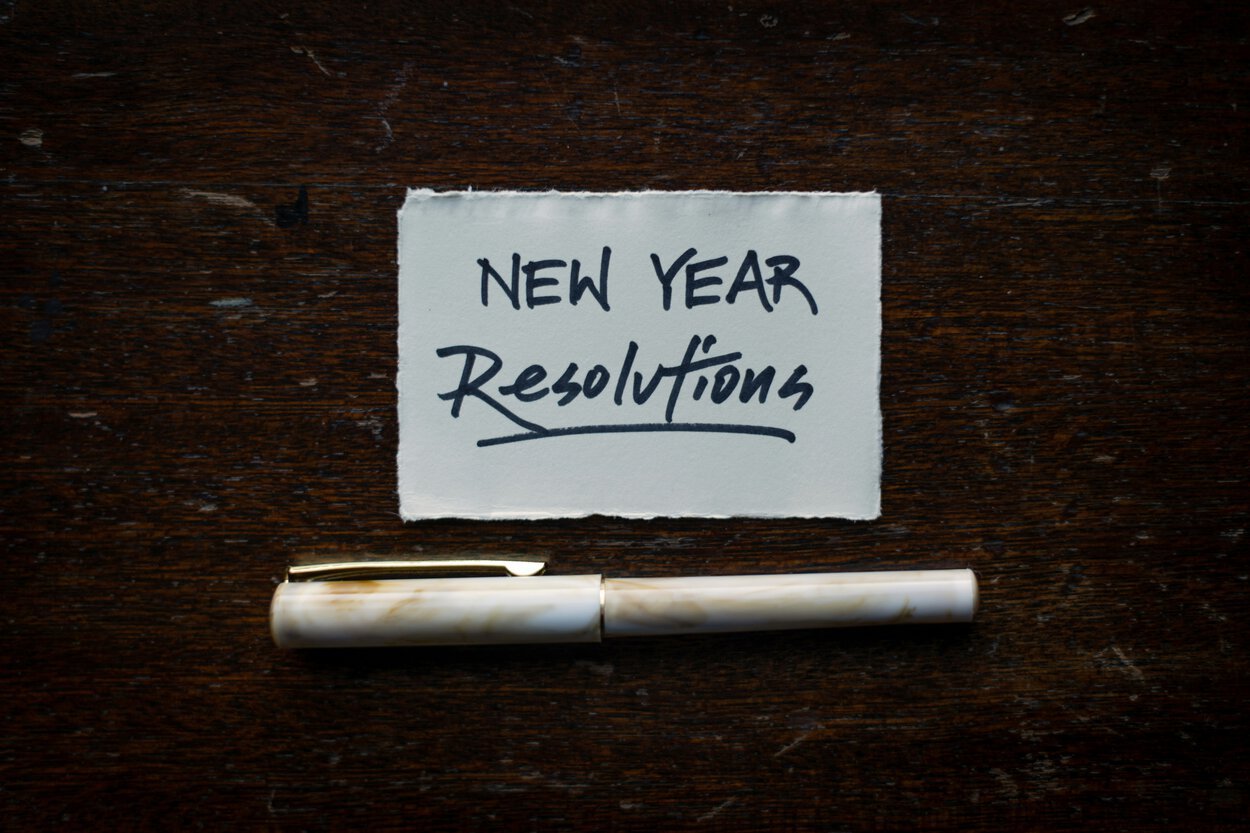New Year, Same Struggle: Why New Year Resolutions Fail
Creating a lasting change is a topic that is very close to my heart.
This article is a bit of a re-work from a similar blog post about new year’s resolutions I penned last year. It morphs from writing a short form piece for my Instagram and in the process of writing, I had a robust flow of idea, and I felt that it became too long of an article to sit on my social media.
So, here goes a 2 part series on why I think new year's resolutions tend to fail and what to do instead.
Check out the other article in the “New Year’s Resolution, End of the Year Reflection” series:
End of the year reflection: Crafting your narrative in the year’s final chapter
Intentional Life 101: Live life in your own terms
For many of us, a new year represents a fresh start, which typically signal a new beginning, a clean slate.
When something comes to an end, we will gravitate towards a new beginning.
The reality of new year’s resolutions for many of us, including myself, is that we want a big, spectacular, revolutionary restart. And we also regularly fail to keep them.
Why do we make New Year Resolutions (to start with)?!?
Creating New Year’s resolutions is
a tradition that dates all the way back to the Babylonians 4,000 years ago. People practise it from generation to generation.
Some of the most commonly quoted goals are: exercise more, smoke less, be more mindful and present, eat healthily to name a few.
In the past, I was filled with a burst of optimism heading into the new year. Though, after committing to doing the activities for a month, I found it overwhelming. I felt defeated.
That’s why I experimented with settling with something more attainable to do month after month.
Hate to admit, though this is true that optimism alone will not translate a list into actions. Here’s why:
We’re thinking too big
When we talk about resolutions, we often associate them with big and spectacular. Things that would require a huge 180 shift in habits like getting more sleep, adopting a new diet, becoming super fit, and the list goes on. These big, sweeping changes sound sexy on paper, though we are not wired to go from a regular Joe to a professional marathon within a month! That’s why big new year resolution fail.
In order to make big, lasting changes, we need to be comfortable with being uncomfortable!
A lot of New Year’s resolutions has something to do with settling with a new habit or drastically changing an existing one. Habits are automatic and conditioned responses. It is the routine and activities you do day in day out without blinking an eye. You get up in the morning, make coffee, and get ready for work. You make a quick stop at Whole Food after work to grab your favourite Tomato and Pepperoni Pizza every Friday. That’s habit.
Contrary to some opinion, undoing an old habit and creating new ones take time and repetition.
“A habit is a routine or behaviour that is performed regularly and, in many cases, automatically…Changes that seem small and unimportant at first will compound and turn into remarkable results if you are willing to stick with them for years.” -Atomic Habit-
We don’t have a clear why
Any change is hard, so it is only natural for us to pop the question, “doing all these actions are hard, so give me reasons to make it worthwhile going through the pain!”
So often, we create new year’s resolutions based on what we see in the media or hear our friends proclaim doing. When we based our actions on what we think we should do, typically it will not go far. We don’t have enough buy in.
Our self story
Well, we all have stories and perceptions about ourselves. We have some idea of who we are as a person and what we deem as important. These self-stories or, dare I claim, self-perception have great influence over our decisions and actions. Whether you realize it or not, we tend to make a decision or act in a way that is consistent with our self-perception.
If you ever want to change your behaviour, or create a new habit, you have to start with evaluating your self-perception. What prompted you to do some of the things that you do? What are you getting out of those actions? If there is something you wish to change about that behaviour, what motivated you to change?
The most commonly cited reasons on why new year resolutions fail:
In many cases, new year resolutions revolve around optional things that we don’t think through far enough how it would look like implementing it day in day out.
It is not a question of enduring it for several weeks or months. One example that came to mind is intending to go to the gym 4 times a week, all the while someone hates weightlifting or an overly prescriptive routine.
Hey, full disclosure here, this was me a few years ago, so I am not highlighting an example because I think it is silly. I slipped into this slippery slope before, and after enduring many years of feeling bad for not keeping up with my new year resolutions, I felt motivated to come up with something that is more long-term and sustainable.
Things shifted for me when I asked myself a deeper WHY behind certain things.
I ended up sticking with doing Pilates after a run because I want to develop a toned body by relying on my own weight. I also want to be able to exercise at a time that works best for me as I felt that a scheduled class felt overly restrictive for me. Though, in my personal life I know a handful of people who mentioned to me that this system will not work for them as having a set time motivated them to do it. So, it all boils down to knowing yourself and the reasons why you want to do certain things your way.
We are not ready for change
Aside from the fact that change is hard, the reality about committing to any changes is that there are several stages to making any changes happen.
Some of you might be familiar with the model:
PRE-CONTEMPLATION→that time when you’re aware that something gotta change, though not sure yet if it’s worth all the hassle
CONTEMPLATION→that time when you started having a rough ideas about what changes you want to make and how to go about making it happen
PREPARATION→that time when you have weighed the pros and cons and gearing yourself to go through the hassle
ACTION→that stage where you have identified what needs to be done and ready to get cracking
MAINTENANCE→that sweet spot when you started seeing results from some of the changes you implemented. Now it’s time to commit to making that change part and parcel of your life.
The thing with New Year Resolutions is that most people force themselves to move from the precontemplation to the action and maintenance stage instantly.
There goes another point on why most new year resolution fail.
There has to be a certain amount of intentionality to make any changes sustainable.
At glance it might seem like I hate new year’s resolutions,.. Though all in all, I would not say that I hate it as much as over time my perspective on it shifted and it’s just not working the best for me.
I am a firm believer of defining life on your own terms, so if doing resolutions happen to work for you, I would actually love to hear from you. In what way does it work for you?
For those of you who are like me, feeling a mixture of terrified yet excited at the same time when we think about ushering in the new year, I would love to hear your thoughts on what I shared above.
If you feel you would benefit from having a sounding board to make those thoughts come into fruition, I welcome you to book a time for us to get chatting :)
Hello, I’m Nita Agustin
Registered Clinical Counsellor based in Burnaby, BC
My jam is helping curious and questioning queer youth and young adults move from confusion to clarity.
Most of my clients shared feeling overwhelmed by the messages the world told them how they’re supposed to be. They do not want to be defined by what society told them about themselves.
In our work together, I guide clients in figuring out who they are, who they want to be, and how to get there. We do this by processing how their past impacted the way they live out their life today. From our work together, I noticed clients develop better self-awareness and experience improved quality of life as they can show up differently in their relationships.
I offer virtual and in-person sessions in Brentwood, North Burnaby. In the summer I also offer walk-and-walk in Confederation Park.
I am licensed to practise in BC, as well as all across Canada, so I support clients all over BC, all the way from Vancouver to Kitimat. Other than working with clients who reside in BC, I also can support clients who reside in Yukon Territories, Northwest Territories, Nunavut, Saskatchewan, Manitoba, and Newfoundland.
Check out my About me page to learn more about what I do and have to offer for you. Also, explore my Services page to see how I can guide you in making shifts in your life today. If you feel ready to discover ways to live life on your own terms, I welcome you to book an initial intake session. I am so stoked to meet you and start figuring out how you can show up as your best self!
Throughout this pandemic, I witnessed telehealth virtual sessions become more of a norm, and it has been super transformative seeing clients can access mental health services from the comfort of their home.
There are lots of different stereotypes out there, and society tells us who we are supposed to be and what we are supposed to do in the world. It can feel very overwhelming and confusing to compare our personal experience against those ideas. The thing is, you no longer have to be defined by what society tells you. It is your life to live, and you get to decide who get a say about your life.







